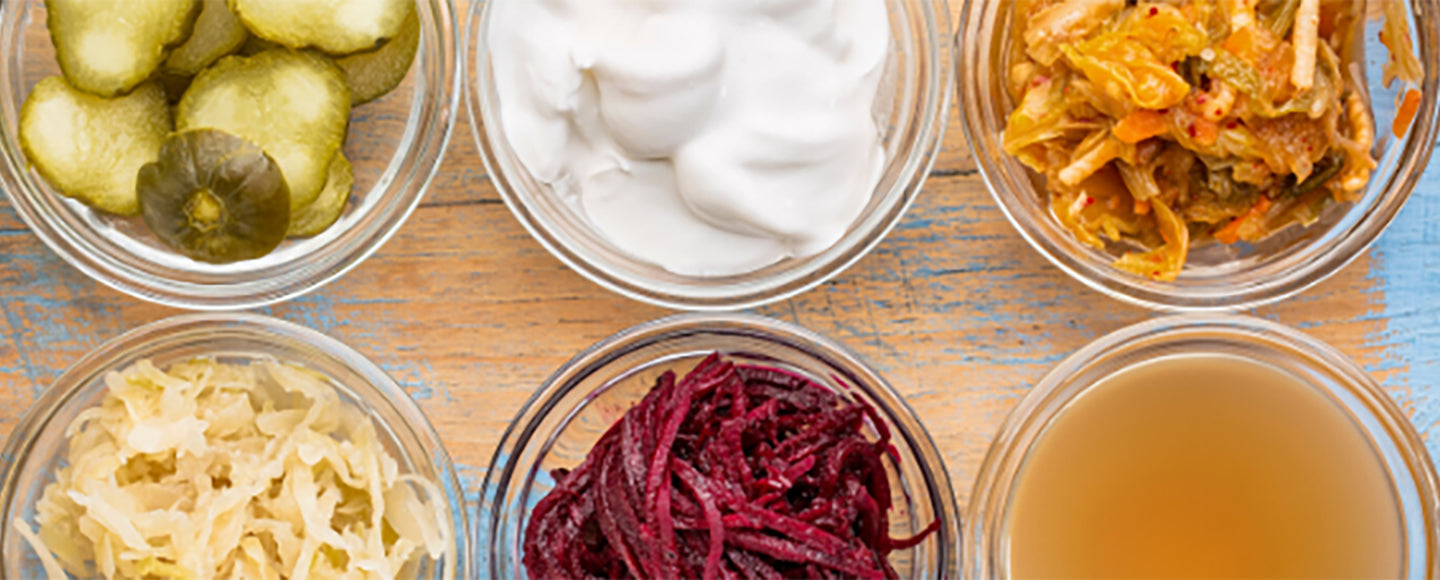
Fermented Food & Beverages To Boost Digestion & Overall Health
share
Although fermented foods and beverages have long been part of many cultures, some as far back as 2000 years, we are only now really seeing a big increase in popularity and consumption of these here in Australia. Whilst they may seem just like a trend to some, fermented foods and beverages have a whole host of benefits that you can reap with regular consumption. The myriad of health benefits of fermented foods and beverages is largely due to the production of beneficial bacteria and acids produced during the fermentation process.
Why ferment foods and beverages?
Fermentation of foods and beverages dates back to the time before we had refrigerators or electricity to store our food and beverages and had to rely on other methods to stop food from spoiling. Fermentation is an anaerobic (without oxygen) process that converts carbohydrates (such as sugar) into either alcohols and carbon dioxide or to organic acids.
The process involves the presence of bacteria, yeast or a combination of the two. The bacteria and yeast are responsible for converting the carbohydrates into bacteria strains that are beneficial probiotics. This increase in beneficial bacteria or probiotics helps us in many ways including gut health and assisting to reduce bloating, indigestion and poor bowel function. There is sufficient evidence to suggest a strong connection with gut health and brain function, including focus, clarity and energy levels.
Fermented Foods & Beverages – Immune Health
Supporting a healthy digestive system is essential for maintaining immune functions, and vice versa. The gastrointestinal system is a passageway between the external environment and internal systems, being a means of access for harmful pathogens such as bacteria or viruses. The intestinal mucosa and microbiota have natural protective mechanisms which are regulated by the immune system. Around 70% of our immune system is found in our gut.
Microbiota, also known as microflora is a community of trillions of live micro-organisms such as bacteria, mostly residing in the gut. The immune system and the healthy microflora of the gut have a synergistic relationship. The microflora signal to the immune system via chemical messages to receptors on immune cells that line the gut wall. These signals can elicit immune responses to various stimuli including pathogens and food sensitivities. Various factors of the modern lifestyle may cause an imbalance in the microbiota (dysbiosis). Dysbiosis can interrupt cross-talk between the immune and gastrointestinal systems, causing immune dysregulation, altered immune responses and increase susceptibility to pathogens and infections.
Fermented foods and beverages consumed through our diet help to maintain healthy gut microbiota. The fermentation process increases the level of nutrients and so these foods become nutrient powerhouses containing probiotics, fibre, antioxidants, vitamins and minerals. The probiotic cultures found in fermented foods help the gut to restore healthy microflora balance and support the growth of healthy intestinal microbiota. Research displays that probiotics have beneficial effects on intestinal health and microflora balance. This supports healthy cross-talk between the immune and digestive systems and therefore helps to support immune health and function.
So, what are some of the popular fermented food and beverage options?
Kombucha
Kombucha’s popularity has been growing rapidly with this drink now being available almost anywhere, from health food stores to cafes, restaurants and even convenience stores. Homebrewing has taken a shift with many people now brewing kombucha at home, in a relatively simple fermentation process.
You may actually be surprised to learn that kombucha is not a new creation, but in fact, has been consumed for approximately 2000 years. It is believed to have started in China or Japan. Kombucha is a probiotic and nutrient-rich drink that is made from adding a SCOBY (a symbiotic colony of bacteria and yeast) to green or black tea and fermenting with sugar. The good news is that the sugar is needed in the fermentation process and the majority of it (around 90%) is actually utilised during this process so the end product is actually a low sugar drink. (Do keep an eye on the label however as some mass-produced products may have sugar added to the drink to help with flavour).
What is SCOBY?
SCOBY is the living culture that is added to the tea and sugar, often referred to as “The Mother” as it is responsible for turning the tea to “kombucha”. SCOBY is a blob-like disc that covers the surface of the liquid and provides a seal to prevent air from entering the liquid, ensuring the fermentation happens in an anaerobic environment.
Benefits of Kombucha?
Apart from the wonderful probiotic benefits of this drink already discussed, kombucha is naturally high in antioxidants which assist us in fighting free radicals that may damage our cells. When kombucha is made from green tea, it will contain the powerful antioxidants known as polyphenols. Polyphenols have long been documented as important antioxidants. Another wonderful benefit of consuming kombucha is that it is high in acetic acid due to the fermentation process. Acetic acid may kill potentially harmful microorganisms in our gut, further assisting gut health.
Kefir
Kefir’s popularity may not be as widespread as kombucha in Australia; however it is very popular in the Middle East and Europe with its numerous health benefits make this cultured, creamy product a great addition to your diet. Another great thing about kefir is it can be cultured from dairy and non-dairy making it suitable for most people. The milk-based kefir is generally well tolerated by most, even those with sensitivities to lactose as it contains the lactase enzyme needed for proper digestion of the often-troubling lactose.
Kefir is similar in texture to drinking yoghurt, with a tart, slightly effervescent refreshing taste that has been long used throughout the Middle East, Eastern European and Russian cultures. Like kombucha, kefir is naturally high in probiotics, but also has a broad spectrum of yeasts making it very nutritious and a beneficial addition to your diet.
Like any fermented product, there are specific bacterial strains needed to produce individual products. In kefir’s case, it is the kefir grains that are used to create it. These grains contain both bacteria and yeasts, in white/yellow grain-like clumps. The grains are what is needed for the milk to ferment, and the beauty of these grains is that once the fermentation process has finished, they can be strained from the mixture and reused to make new batches.
Sauerkraut
Sauerkraut translates to “sour cabbage” in German and is a fermented cabbage dish that has been widely consumed throughout Central Europe for hundreds of years and is widely known, even here in Australia. Sauerkraut not only provides beneficial probiotics and antioxidants, but it is also a great source of fibre and is low in calories.
Keep in mind, however, it can be high in sodium as salt is one of the main ingredients in this dish, so stick with smaller serving size, having it as a snack or a side dish.
share
Stay Informed. Feel Your Best.
Get expert tips and actionable health advice. Be the first to hear about Caruso's product launches and receive exclusive promotional offers.
Join our newsletter today.



